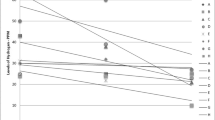Abstract
Objective: This review summarises the effects of lactic acid bacteria on lactose malabsorption, bacterial/viral or antibiotic associated diarrhoea, and describes the impact of lactic acid bacteria on cancer and the fermentative products in the colon.
Results: Eight studies (including 78 patients) demonstrated that lactase deficient subjects absorbed lactose in yogurt better than lactose in milk, while two studies (25 patients) did not support this. Two studies (22 patients) showed that unfermented acidophilus milk was absorbed better than milk, while six studies (68 patients) found no significant differences. Addition of lactose hydrolysing enzyme, lactase, to milk improved lactose malabsorption in seven studies (131 lactose malabsorbers), while one study (10 malabsorbers) demonstrated no improvement. Lactic acid bacteria alleviated travellers’ diarrhoea in one study (94 individuals) while a study including 756 individuals was borderline statistically significant. One study (50 individuals) did not find an effect of lactic acid bacteria on travellers’ diarrhoea. Six studies (404 infants) demonstrated a significant effect of lactic acid bacteria on infant diarrhoea, while one study (40 infants) did not. Lactic acid bacteria moderated antibiotic associated diarrhoea in three studies (66 individuals), while two studies (117 individuals) were insignificant.
Conclusions: Lactase deficient subjects benefit from a better lactose absorption after ingestion of yoghurt compared with milk and from milk added lactase, whereas ingestion of unfermented acidophilus milk does not seem to improve lactose absorption. The majority of studies support that lactic acid bacteria alleviate bacterial/viral induced diarrhoea, especially in infants, while the effect on antibiotic associated diarrhoea is less clear.
Experimental studies indicate an effect of lactic bacteria on human cell cancer lines, but clinical evidence is lacking. A ‘stabilising’ effect of lactic acid bacteria on the colonic flora has not been documented.
Similar content being viewed by others
Author information
Authors and Affiliations
Rights and permissions
About this article
Cite this article
Hove, H., Nørgaard, H. & Brøbech Mortensen, P. Lactic acid bacteria and the human gastrointestinal tract. Eur J Clin Nutr 53, 339–350 (1999). https://doi.org/10.1038/sj.ejcn.1600773
Received:
Revised:
Accepted:
Published:
Issue Date:
DOI: https://doi.org/10.1038/sj.ejcn.1600773
- Springer Nature Limited
Keywords
This article is cited by
-
Challenges and future directions for studying effects of host genetics on the gut microbiome
Nature Genetics (2022)
-
Multi-omic profiling reveals associations between the gut mucosal microbiome, the metabolome, and host DNA methylation associated gene expression in patients with colorectal cancer
BMC Microbiology (2020)
-
Adhesion mechanisms of lactic acid bacteria: conventional and novel approaches for testing
World Journal of Microbiology and Biotechnology (2019)
-
The molecular and phenotypic characterization of fructophilic lactic acid bacteria isolated from the guts of Apis mellifera L. derived from a Polish apiary
Journal of Applied Genetics (2018)




